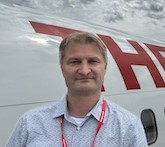|
|
Biography: Dr. Gernot Konrad is an aerospace engineer with extensive avionics and pilot vehicle interface experience, demonstrated through over 20 years of designing and certifying highly integrated flight decks with complex systems for small and large aircraft. This includes over 10 years of technical leadership, applying diverse skills for Agile technology development, and coordinating collaborative multi-level and multi-disciplinary teams. He holds an advanced degree (Dipl.-Ing) and a doctorate (Dr.-Ing) in Aerospace Engineering from the University of Stuttgart. He is qualified as an engineer (Ing.) in aeronautics by the Austrian Federal Economic Chamber (WIFO). Throughout his career, he was involved in recruiting and training flight deck Human Factors (HF) practitioners. Today, Dr. Konrad is the Chief Engineer for HF at Honeywell Aerospace Technologies, where he provides HF leadership and vision across multiple program platforms spanning current and future systems for the air transport, regional, business, general aviation, helicopter, and urban air mobility markets. Dr. Konrad is also the chairman of the EASA HF Collaborative Analysis Flight Deck Design and Certification Group, a member of the GAMA Flight Deck HF Working Group, was a member of the RTCA HF Training Steering Committee, and provides an annual seminar on Human Factors Engineering in Flight Deck Design at the University of Stuttgart. Prior positions include Fellow for HF at Honeywell Aerospace Technologies, HF Engineering Group Head at Gulfstream Aerospace, Avionics and HF Engineer at Pilatus Aircraft, Research Associate at the Institute of Aircraft Systems at the University of Stuttgart, and freelance theoretical knowledge instructor at Lufthansa Flight Training and Swiss Aviation Training.
|


 Cart (0)
Cart (0)

